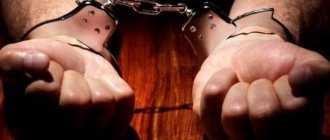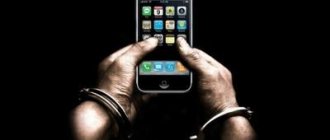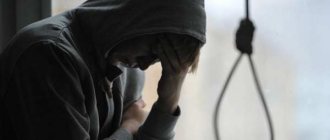Surely, many have heard such a concept as “deputy immunity”, which in any country is met with a sea of criticism and discontent, and this happens in the Russian Federation as well. This immunity is regarded as an element of permissiveness and impunity, which, according to some political scientists, finally “drives a wedge of mistrust” in the ruling structure of the country. This article will not talk about immunity, but a provision that is similar in meaning - this is responsibility for an attack on the life of a statesman or public figure, as well as what the qualifying features of this act are, and what punishment awaits the perpetrators.
Punishment for an attack on the life of a statesman or public figure.
Composition and qualifications
So, it’s worth starting right away with the provisions of Article 277 of the Criminal Code of the Russian Federation, which reveals the essence of the crime in question, namely:
An attack on the life of a statesman or public figure, committed in order to stop his state or other political activities or out of revenge for such activities, is punishable by imprisonment for a term of twelve to twenty years with restriction of freedom for a term of up to two years, or life imprisonment, or the death penalty.
From the above provision we can conclude that the object of the attack under Art. 277 of the Criminal Code of the Russian Federation are social relations and judgments that are formed from constitutional and political foundations and from ensuring the continuous implementation of state and public provisions. But, in addition to the listed basics, the obligatory object of this crime is an attempt/attack on life, that is, the presence of intent to cause death.
This is an important point, since the absence of a guilty desire to kill a statesman or public figure, even if serious harm to health was caused, does not constitute the crime in question. Taking into account the above aspects and based on current regulations, we can identify the following persons who can be recognized as victims under Article 277 of the Criminal Code of the Russian Federation:
Statesmen Public figures President of the Russian Federation Members of the Public Chamber of Russia Members of the Government of the Russian Federation Philanthropists and patrons of the arts in Russia Judges of the Constitutional Court of the Russian Federation Leaders of non-prohibited religious denominations Members of the Security Council Leaders of trade unions Assistants and advisers to the President of the Russian Federation Leaders of political parties Deputies of federal and regional levels Heads of public associations Presidential candidates Leaders of opposition parties, movements and organizations Members of election commissions Candidates for the executive and legislative bodies of the Russian Federation
This list can go on for a very long time, the main thing that needs to be understood is that the activities of the “victims” must be based on legal grounds and properly registered. In this case, the victim cannot be a person with foreign citizenship or a person representing an international organization, as well as relatives of the above categories of citizens.
The objective side of the crime in question is truncated and is considered completed from the moment the guilty person carries out any actions related to an actual encroachment on the life of a public or government figure, for example, targeted shooting at vital organs, a stab in the heart, etc.
On the subjective side, in addition to direct intent to cause the death of an actor, there must be motives to suppress the victim’s legitimate state or political activities or as revenge for its commission.
For example, let’s assume the following fictitious situation: Citizen “A” extremely disagreed with the decisions of the local head of administration, citizen “B”, of his small hometown. Despite the fact that “B’s” actions did not violate the provisions of the current legislation, at least directly, the residents of the settlement “screamed out loud” from his decisions. Citizen “A”, radically inclined to change the rules established by the head of the administration, during the opening of another dubious establishment in the city, using a hunting rifle, fired two accurate shots at citizen “B” in the chest area. By chance, the victim was saved.
Encroachment on the life of a statesman or public figure. Demarcation from murder
Object of crime –
the constitutional principle of political and ideological diversity and multi-party system (political system of the Russian Federation), as well as human life.
Objective side –
encroachment on the life of a statesman or public figure. Assault on life – murder or attempted murder.
A statesman is a person holding a high position in the system of government bodies, who, through his activities, actively implements the policy of the state in various fields of activity. The victim is only a state or public figure.
Public figures are leaders or prominent members of various public organizations and parties, mass movements, trade unions, as well as prominent figures in science, culture, etc.
An attempt on life is considered completed from the moment of committing socially dangerous actions aimed at depriving the victim of life; if the death of the victim occurs, an attempt was made on his life.
This composition can be called foral-material
An attack on the life of ordinary civil servants or ordinary representatives of public and other organizations is covered by murder under Art. 105 of the Criminal Code of the Russian Federation, or offenses against the life of a person carrying out justice or preliminary investigation. Art. 295. or attacks on the life of a law enforcement officer. Article 317.
Subjective side-
guilt in the form of direct intent. The perpetrator realizes that he is not encroaching on the life of a private person, but rather a state or public figure, foresees the inevitability or possibility of the death of the victim and wants to cause it. At the same time, he pursues the goal of stopping the state, general or other political activities of the victim. Eliminate a political opponent or competitor in the struggle for the highest position in government. It is precisely such motives that exclude the commission of such a crime with indirect intent.
If the murder of a state or public figure was committed for another purpose or for other reasons, then the act is qualified under Article 105 of the Criminal Code.
Subject of the crime -
a person who has reached the age of 16, if a minor aged 14 to 16 years is responsible for this crime under clause “b”, part 2 of Art. 105 of the Criminal Code.
55. Violent seizure of power or violent retention of power. Armed rebellion. 278, 279
Object of crime -
the political system of the Russian Federation, in terms of the legitimacy of the state. power, the constitutional order of establishment and functioning of state. authorities and its bodies. M.b. additional object – health, bodily integrity, honor and dignity of persons affected by violent acts.
Objective side - There are two of them.
1. Actions aimed at the forcible seizure or forcible retention of power in violation of the Constitution of the Russian Federation. This is an attempt at an unconstitutional method for political parties, movements and other political forces to come to power, or an attempt to retain power in violation of the Constitution of the Russian Federation in the Russian Federation or its constituent entities without changing the constitutional system of the Russian Federation. There is only one way to seize and maintain power - violence. It means beatings, causing harm to the health of persons representing government bodies formed in accordance with the constitution and laws of the Russian Federation. Forcible retention of power - refusal to cede power contrary to the results of elections, voting, referendum, etc. combined with the use of violence against representatives of political forces to whom state power should pass.
2. Actions aimed at forcibly changing the constitutional system of the Russian Federation. These acts are violent actions aimed at changing the social system, political system or state structure of the Russian Federation. This is an attempt to forcibly change the foundations of the constitutional system of the Russian Federation and its main political institutions. Violence may be with the use of weapons.
The corpus delicti is formal. The crime is considered completed from the moment of committing actions aimed at forcibly seizing or forcibly retaining power in violation of the Constitution of the Russian Federation, or actions aimed at forcibly changing the constitutional system of the Russian Federation, regardless of whether the perpetrators succeeded or failed to carry out their criminal plans.
If the death of a person is caused as a result of the use of violence, then it is covered by this crime and requires additional qualification under Article 277 (assault), 317 or 105.
Subjective side –
direct intent and special purpose. The perpetrator is aware of the violent nature of his actions and their contradiction to the Constitution of the Russian Federation and wants to commit them. They pursue the goal of unconstitutionally seizing power, retaining it, or changing the constitutional system of the Russian Federation.
Subject -
a person who has reached 16 years of age.
Special subject –
a representative of government bodies formed in accordance with the Constitution of the Russian Federation, but obliged in accordance with it to transfer state power to political forces that came to power through constitutional means.
279 Armed rebellion.
Object of crime -
the political system of the Russian Federation in terms of the inviolability of the foundations of the constitutional system and the inviolability of the territorial integrity of the Russian Federation.
Objective side -
organizing an armed rebellion or active participation in it.
Rebellion is a spontaneous uprising, an armed crime against the government, a provoked, organized armed uprising against the legitimate government, the constitutional system of the Russian Federation.
Organizing a rebellion - actions to promote an armed rebellion, recruit its participants, supply the rebels with weapons, plan armed operations, etc.
Active participation in an armed rebellion - committing violent acts together with other participants using weapons or attempting to use them.
An armed rebellion is a complete crime from the moment of the first armed action of the rebels. If the actions were aimed at organizing a rebellion, but did not actually lead to it, then they should be qualified as preparation for an armed rebellion.
Subjective side-
direct intent and special purpose. The culprit realizes that he is organizing an armed rebellion and is actively participating in it. Wants to take these actions. At the same time, it necessarily sets a goal: to overthrow the constitutional order, forcibly change the constitutional system, and violate territorial integrity.
Subject-
a person over 16 years of age.
56. Sabotage. Difference from intentional destruction or damage to property, from terrorism. 281.
An object
— economic security and defense capability of the Russian Federation.
Economic security is the state of protection of the most important economic interests of the Russian Federation, the coordinated and uninterrupted work of individual parts of the economy as a single complex.
Defense capability is protection from a possible attack by an external aggressor and includes the economic and military potential of the Russian Federation, combat training and professionalism of the personnel of the armed forces of the Russian Federation, and the mobilization readiness of the civilian population.
Objective side –
explosion, arson or other actions (causing accidents, catastrophes, flooding, etc.) aimed at destroying or damaging enterprises, structures, routes and means of communication, communications, life support facilities for the population.
A mandatory sign of sabotage is the aim of destroying or damaging the listed national economic objects. Their physical destruction.
The composition of the sabotage is formal. The crime is over from the moment the explosion, arson, etc. is committed, even if the objects were not actually destroyed or damaged.
If there are human casualties as a result of sabotage, then the act forms a combination of sabotage and murder under aggravating circumstances.
Subjective side-
direct intent. The culprit is aware of the actual content of the actions being performed (explosion, arson) and their focus on destruction or damage to the object and wants to commit them. A mandatory feature will be the goal of undermining the economic security and defense capability of the Russian Federation.
Subject-
a person who has reached 16 years of age. If a crime is committed by a citizen of the Russian Federation on instructions from foreign services, then it is additionally qualified as high treason.
Qualified sabotage is carried out by an organized group.
57. Legalization (laundering) of funds or other property acquired by criminal means. Restriction from the acquisition or sale of property known to have been obtained by criminal means. 174, 174.1
For the first time, the norm on criminal liability was introduced by the Criminal Code of the Russian Federation, which came into force on January 1, 1997. But the state of financial control was such that there was no need for criminals to launder money. They built expensive houses, bought expensive cars, etc. without fear of being brought to justice for this. In February 2002, the Federal Law “On Combating the Laundering of Proceeds from Crime” came into force. The new law requires a literal interpretation.
Object
t- social relations in the sphere of redistribution of material goods.
The subject of the crime under Article 174 is the date of the Wed or other name, knowingly acquired by other persons through criminal means. According to Art. 174.1 - money or other name, knowingly acquired by a person as a result of committing a crime.
The crime that was the source of income is called the main crime. The person who committed the underlying crime may die before he is convicted, but this does not relieve him of liability for money laundering.
The elements of both crimes are formal, alternative (purchase and sale of them).
Objective side
— 174 – carrying out large-scale financial transactions and other transactions with the specified items.
Financial operations are transactions and other actions with funds, securities, and payment documents aimed at establishing, changing or terminating civil rights and obligations associated with them.
Transaction – actions of citizens and legal entities aimed at establishing, changing or terminating civil rights and obligations.
According to Article 174.1 - object party - carrying out on a large scale not only financial transactions and other transactions, but also in the use of these items for carrying out business or other economic activities. The use of these items entails liability regardless of the cost of these items. Financial transactions and transactions entail liability when they are carried out on a large scale (over 2000 million rubles). They might legal or illegal Methods of money laundering do not affect the qualification of the crime
Subjective side-
both crimes - direct intent. There must be a goal of giving a lawful appearance to the possession, use, and disposal of it.
Subject
- Article 174 a person who has reached 16 years of age, except for a person laundering property acquired by him or her as a result of a crime. Art. 174.1 - a person who has reached 16 years of age launders property acquired by himself as a result of committing a crime.
Qualifying features:
- a group of persons by prior conspiracy,
-repetition
- use of official position.
An organized group is a particularly qualified attribute.
The article for the acquisition and sale of property that is known to have been obtained by criminal means is applied only in the absence of signs of money laundering (the transaction amount does not exceed 2,000 minimum wages or there is no purpose of imparting a legal appearance to the possession)
The difference is in the subject of the crime (property obtained by criminal means) On the sub side im-in d.b. obviously obtained by criminal means. Subject, just a 16 year old person.
58. Disclosure of state secrets. Loss of documents containing state secrets. Distinction from treason. 283, 284.
An object-
economic security and defense capability of the Russian Federation.
Economic security is the protection of the vital interests of the Russian Federation in the field of finance, science, trade production, etc.
Defense capability is a set of political, economic, military, social, legal and other measures to prepare for armed defense against internal and external attacks.
Objective side
- disclosure of state secrets. Making public or distributing in violation of the established procedure information that constitutes a state secret, as a result of which it becomes known to other persons who do not have access to the relevant information. Leaving secret documents unattended, which may become known to other people, may constitute the corpus delicti of this crime. In this case, there must be indirect intent, or two forms of guilt.
Information containing state secrets is information protected by the state in the field of military, foreign policy, economic, intelligence, counterintelligence, operational and investigative activities, the dissemination of which could harm the security of the Russian Federation.
Disclosure m.b. both oral and written (media). Can be expressed not only in action but also inaction (leaving documents in a place accessible to strangers)
A mandatory sign is the lack of awareness on the part of the perpetrator that the publicity or transfer of secret information could cause damage to the external security of the Russian Federation.
The crime is completed when the specified information becomes available to an outsider.
Subjective side
– guilt in the form of direct or indirect intent.
Subject-
a person who has reached 16 years of age.
A special subject is a person to whom the disclosed information was entrusted or became known through his service or work.
The motives for disclosure may be talkativeness, bragging, desire to show one’s importance, coercion by criminal structures
Qualifying features:
- grave consequences - cases of disclosure of information when it became the property of foreign intelligence services.
- in relation to the consequences of guilt, it is characterized only by negligence (frivolity or negligence) Double form of guilt.
Loss of documents.
An object-
economic security and defense capability of the Russian Federation.
Objective side
— violation of the rules for handling documents containing state secrets and objects, information about which constitutes a state secret.
A mandatory sign is the consequences in the form of loss of documents containing state documents. secret, items, information about which constitutes a state secret, as well as other grave consequences (material composition).
Loss is the release of documents containing state secrets, or items, information about which constitutes state secrets. a secret from the possession of a person who has access to the state. secret. The destruction of documents does not constitute loss, since this excludes the possibility of other persons familiarizing themselves with them. In such cases, the act is qualified as a crime in office or a crime against property.
The crime is completed from the moment the document or object is lost and grave consequences occur. There are serious consequences when, as a result of the disclosure of information, it becomes the property of foreign intelligence services.
Subjective side
– guilt in the form of negligence (frivolity, negligence).
Subject – person
who have reached 16 years of age.
A special subject is a person who has access to state secrets.
Differences - the object of treason is the external security of the Russian Federation,
Object of crime –
the constitutional principle of political and ideological diversity and multi-party system (political system of the Russian Federation), as well as human life.
Objective side –
encroachment on the life of a statesman or public figure. Assault on life – murder or attempted murder.
A statesman is a person holding a high position in the system of government bodies, who, through his activities, actively implements the policy of the state in various fields of activity. The victim is only a state or public figure.
Public figures are leaders or prominent members of various public organizations and parties, mass movements, trade unions, as well as prominent figures in science, culture, etc.
An attempt on life is considered completed from the moment of committing socially dangerous actions aimed at depriving the victim of life; if the death of the victim occurs, an attempt was made on his life.
This composition can be called foral-material
An attack on the life of ordinary civil servants or ordinary representatives of public and other organizations is covered by murder under Art. 105 of the Criminal Code of the Russian Federation, or offenses against the life of a person carrying out justice or preliminary investigation. Art. 295. or attacks on the life of a law enforcement officer. Article 317.
Subjective side-
guilt in the form of direct intent. The perpetrator realizes that he is not encroaching on the life of a private person, but rather a state or public figure, foresees the inevitability or possibility of the death of the victim and wants to cause it. At the same time, he pursues the goal of stopping the state, general or other political activities of the victim. Eliminate a political opponent or competitor in the struggle for the highest position in government. It is precisely such motives that exclude the commission of such a crime with indirect intent.
If the murder of a state or public figure was committed for another purpose or for other reasons, then the act is qualified under Article 105 of the Criminal Code.
Subject of the crime -
a person who has reached the age of 16, if a minor aged 14 to 16 years is responsible for this crime under clause “b”, part 2 of Art. 105 of the Criminal Code.
55. Violent seizure of power or violent retention of power. Armed rebellion. 278, 279
Object of crime -
the political system of the Russian Federation, in terms of the legitimacy of the state. power, the constitutional order of establishment and functioning of state. authorities and its bodies. M.b. additional object – health, bodily integrity, honor and dignity of persons affected by violent acts.
Objective side - There are two of them.
1. Actions aimed at the forcible seizure or forcible retention of power in violation of the Constitution of the Russian Federation. This is an attempt at an unconstitutional method for political parties, movements and other political forces to come to power, or an attempt to retain power in violation of the Constitution of the Russian Federation in the Russian Federation or its constituent entities without changing the constitutional system of the Russian Federation. There is only one way to seize and maintain power - violence. It means beatings, causing harm to the health of persons representing government bodies formed in accordance with the constitution and laws of the Russian Federation. Forcible retention of power - refusal to cede power contrary to the results of elections, voting, referendum, etc. combined with the use of violence against representatives of political forces to whom state power should pass.
2. Actions aimed at forcibly changing the constitutional system of the Russian Federation. These acts are violent actions aimed at changing the social system, political system or state structure of the Russian Federation. This is an attempt to forcibly change the foundations of the constitutional system of the Russian Federation and its main political institutions. Violence may be with the use of weapons.
The corpus delicti is formal. The crime is considered completed from the moment of committing actions aimed at forcibly seizing or forcibly retaining power in violation of the Constitution of the Russian Federation, or actions aimed at forcibly changing the constitutional system of the Russian Federation, regardless of whether the perpetrators succeeded or failed to carry out their criminal plans.
If the death of a person is caused as a result of the use of violence, then it is covered by this crime and requires additional qualification under Article 277 (assault), 317 or 105.
Subjective side –
direct intent and special purpose. The perpetrator is aware of the violent nature of his actions and their contradiction to the Constitution of the Russian Federation and wants to commit them. They pursue the goal of unconstitutionally seizing power, retaining it, or changing the constitutional system of the Russian Federation.
Subject -
a person who has reached 16 years of age.
Special subject –
a representative of government bodies formed in accordance with the Constitution of the Russian Federation, but obliged in accordance with it to transfer state power to political forces that came to power through constitutional means.
279 Armed rebellion.
Object of crime -
the political system of the Russian Federation in terms of the inviolability of the foundations of the constitutional system and the inviolability of the territorial integrity of the Russian Federation.
Objective side -
organizing an armed rebellion or active participation in it.
Rebellion is a spontaneous uprising, an armed crime against the government, a provoked, organized armed uprising against the legitimate government, the constitutional system of the Russian Federation.
Organizing a rebellion - actions to promote an armed rebellion, recruit its participants, supply the rebels with weapons, plan armed operations, etc.
Active participation in an armed rebellion - committing violent acts together with other participants using weapons or attempting to use them.
An armed rebellion is a complete crime from the moment of the first armed action of the rebels. If the actions were aimed at organizing a rebellion, but did not actually lead to it, then they should be qualified as preparation for an armed rebellion.
Subjective side-
direct intent and special purpose. The culprit realizes that he is organizing an armed rebellion and is actively participating in it. Wants to take these actions. At the same time, it necessarily sets a goal: to overthrow the constitutional order, forcibly change the constitutional system, and violate territorial integrity.
Subject-
a person over 16 years of age.
56. Sabotage. Difference from intentional destruction or damage to property, from terrorism. 281.
An object
— economic security and defense capability of the Russian Federation.
Economic security is the state of protection of the most important economic interests of the Russian Federation, the coordinated and uninterrupted work of individual parts of the economy as a single complex.
Defense capability is protection from a possible attack by an external aggressor and includes the economic and military potential of the Russian Federation, combat training and professionalism of the personnel of the armed forces of the Russian Federation, and the mobilization readiness of the civilian population.
Objective side –
explosion, arson or other actions (causing accidents, catastrophes, flooding, etc.) aimed at destroying or damaging enterprises, structures, routes and means of communication, communications, life support facilities for the population.
A mandatory sign of sabotage is the aim of destroying or damaging the listed national economic objects. Their physical destruction.
The composition of the sabotage is formal. The crime is over from the moment the explosion, arson, etc. is committed, even if the objects were not actually destroyed or damaged.
If there are human casualties as a result of sabotage, then the act forms a combination of sabotage and murder under aggravating circumstances.
Subjective side-
direct intent. The culprit is aware of the actual content of the actions being performed (explosion, arson) and their focus on destruction or damage to the object and wants to commit them. A mandatory feature will be the goal of undermining the economic security and defense capability of the Russian Federation.
Subject-
a person who has reached 16 years of age. If a crime is committed by a citizen of the Russian Federation on instructions from foreign services, then it is additionally qualified as high treason.
Qualified sabotage is carried out by an organized group.
57. Legalization (laundering) of funds or other property acquired by criminal means. Restriction from the acquisition or sale of property known to have been obtained by criminal means. 174, 174.1
For the first time, the norm on criminal liability was introduced by the Criminal Code of the Russian Federation, which came into force on January 1, 1997. But the state of financial control was such that there was no need for criminals to launder money. They built expensive houses, bought expensive cars, etc. without fear of being brought to justice for this. In February 2002, the Federal Law “On Combating the Laundering of Proceeds from Crime” came into force. The new law requires a literal interpretation.
Object
t- social relations in the sphere of redistribution of material goods.
The subject of the crime under Article 174 is the date of the Wed or other name, knowingly acquired by other persons through criminal means. According to Art. 174.1 - money or other name, knowingly acquired by a person as a result of committing a crime.
The crime that was the source of income is called the main crime. The person who committed the underlying crime may die before he is convicted, but this does not relieve him of liability for money laundering.
The elements of both crimes are formal, alternative (purchase and sale of them).
Objective side
— 174 – carrying out large-scale financial transactions and other transactions with the specified items.
Financial operations are transactions and other actions with funds, securities, and payment documents aimed at establishing, changing or terminating civil rights and obligations associated with them.
Transaction – actions of citizens and legal entities aimed at establishing, changing or terminating civil rights and obligations.
According to Article 174.1 - object party - carrying out on a large scale not only financial transactions and other transactions, but also in the use of these items for carrying out business or other economic activities. The use of these items entails liability regardless of the cost of these items. Financial transactions and transactions entail liability when they are carried out on a large scale (over 2000 million rubles). They might legal or illegal Methods of money laundering do not affect the qualification of the crime
Subjective side-
both crimes - direct intent. There must be a goal of giving a lawful appearance to the possession, use, and disposal of it.
Subject
- Article 174 a person who has reached 16 years of age, except for a person laundering property acquired by him or her as a result of a crime. Art. 174.1 - a person who has reached 16 years of age launders property acquired by himself as a result of committing a crime.
Qualifying features:
- a group of persons by prior conspiracy,
-repetition
- use of official position.
An organized group is a particularly qualified attribute.
The article for the acquisition and sale of property that is known to have been obtained by criminal means is applied only in the absence of signs of money laundering (the transaction amount does not exceed 2,000 minimum wages or there is no purpose of imparting a legal appearance to the possession)
The difference is in the subject of the crime (property obtained by criminal means) On the sub side im-in d.b. obviously obtained by criminal means. Subject, just a 16 year old person.
58. Disclosure of state secrets. Loss of documents containing state secrets. Distinction from treason. 283, 284.
An object-
economic security and defense capability of the Russian Federation.
Economic security is the protection of the vital interests of the Russian Federation in the field of finance, science, trade production, etc.
Defense capability is a set of political, economic, military, social, legal and other measures to prepare for armed defense against internal and external attacks.
Objective side
- disclosure of state secrets. Making public or distributing in violation of the established procedure information that constitutes a state secret, as a result of which it becomes known to other persons who do not have access to the relevant information. Leaving secret documents unattended, which may become known to other people, may constitute the corpus delicti of this crime. In this case, there must be indirect intent, or two forms of guilt.
Information containing state secrets is information protected by the state in the field of military, foreign policy, economic, intelligence, counterintelligence, operational and investigative activities, the dissemination of which could harm the security of the Russian Federation.
Disclosure m.b. both oral and written (media). Can be expressed not only in action but also inaction (leaving documents in a place accessible to strangers)
A mandatory sign is the lack of awareness on the part of the perpetrator that the publicity or transfer of secret information could cause damage to the external security of the Russian Federation.
The crime is completed when the specified information becomes available to an outsider.
Subjective side
– guilt in the form of direct or indirect intent.
Subject-
a person who has reached 16 years of age.
A special subject is a person to whom the disclosed information was entrusted or became known through his service or work.
The motives for disclosure may be talkativeness, bragging, desire to show one’s importance, coercion by criminal structures
Qualifying features:
- grave consequences - cases of disclosure of information when it became the property of foreign intelligence services.
- in relation to the consequences of guilt, it is characterized only by negligence (frivolity or negligence) Double form of guilt.
Loss of documents.
An object-
economic security and defense capability of the Russian Federation.
Objective side
— violation of the rules for handling documents containing state secrets and objects, information about which constitutes a state secret.
A mandatory sign is the consequences in the form of loss of documents containing state documents. secret, items, information about which constitutes a state secret, as well as other grave consequences (material composition).
Loss is the release of documents containing state secrets, or items, information about which constitutes state secrets. a secret from the possession of a person who has access to the state. secret. The destruction of documents does not constitute loss, since this excludes the possibility of other persons familiarizing themselves with them. In such cases, the act is qualified as a crime in office or a crime against property.
The crime is completed from the moment the document or object is lost and grave consequences occur. There are serious consequences when, as a result of the disclosure of information, it becomes the property of foreign intelligence services.
Subjective side
– guilt in the form of negligence (frivolity, negligence).
Subject – person
who have reached 16 years of age.
A special subject is a person who has access to state secrets.
Differences - the object of treason is the external security of the Russian Federation,
Another comment on Article 277 of the Criminal Code of the Russian Federation
1. Government officials are heads and other officials of the highest state bodies of legislative, executive and judicial authorities, as well as prosecutorial bodies of the Russian Federation, constituent entities of the Russian Federation, whose activities are of a political nature (the President of the Russian Federation, deputies of the State Duma and members of the Federation Council of the Federal Assembly of the Russian Federation, members of the Government of the Russian Federation, heads of ministries, federal agencies and services, persons holding similar positions in constituent entities of the Russian Federation, prosecutors, judges, etc.).
Public figures are persons who head governing bodies, are members of them or actively participate in the work of political parties, social movements and associations, foundations, trade unions at both the federal and regional levels.
2. Encroachment includes both murder and attempt on the life of a state or public figure (including harm caused to health). It is considered completed from the moment of committing actions directly aimed at taking the life of the victim. The actual causing of death is qualified according to the norms of the commented article.
3. The subjective side of the crime is characterized by direct intent. The obligatory goal is to stop government or other political activity and the motive of the crime is revenge on the victim for such activity.
4. The subject of the crime is a person who has reached the age of 16 years. The actions of a person aged 14 to 16 years fall under the criteria specified in paragraph “b” of Part 2 of Art. 105 of the Criminal Code.
Commentary on Article 277 of the Criminal Code of the Russian Federation
The main object of encroachment on the life of a statesman or public figure is social relations that develop in the internal political sphere of the implementation of state sovereignty. An additional object is social relations that ensure the safety of the victim’s life.
The victim of a crime is a state or public figure. There is no normative definition of these concepts; the characteristics of a statesman or public figure can rightly be considered as evaluative, since the determining factor in the characteristics of the victim is not so much his official or social position as the nature of his official functions, the scale and activity of their implementation, the significance of the victim’s activities for the implementation of certain areas of domestic or foreign policy states.
Government officials include the President of the Russian Federation, members of the Federation Council, deputies of the State Duma, members of the Government of the Russian Federation, judges of the Constitutional Court of the Russian Federation, the Supreme Court of the Russian Federation and the Supreme Arbitration Court of the Russian Federation, the Prosecutor General of the Russian Federation, heads of government bodies of the constituent entities of the Russian Federation and other high-ranking officials, in particular, holding government positions of category “A”. State figures should also include deputies, officially registered candidates for election to government bodies, their proxies, members of election commissions, etc.
Representatives of the authorities (employees of internal affairs bodies, prosecutors, etc.) who are not government officials cannot act as victims of the crime being analyzed. Encroachment on the lives of these persons is provided for in independent articles of the criminal law (Articles 317, 318 of the Criminal Code of the Russian Federation).
Public figures are leaders and prominent functionaries of political parties, other public associations, mass movements, professional, religious organizations, and other public associations of federal or regional significance. On a functional-political basis, well-known, influential representatives of the media, culture, science, and education can be classified as public figures.
State or public figure within the meaning of Art. 277 of the Criminal Code of the Russian Federation must not be a representative of a foreign state or an employee of an international organization enjoying international protection (their list is determined by the UN Convention on the Prevention and Punishment of Crimes against Persons Enjoying International Protection, including Diplomatic Agents, dated December 14, 1973). Encroachments on the lives of these persons are considered by the Criminal Code of the Russian Federation as crimes against peace (Article 360 of the Criminal Code of the Russian Federation).
An attack on the life of persons close to a state or public figure, committed in order to terminate his political activities, cannot be qualified according to the law under Art. 277 of the Criminal Code of the Russian Federation. Such an act deserves a legal assessment under paragraph “b” of Part 2 of Art. 105 of the Criminal Code of the Russian Federation.
A mandatory feature of the crime in question is the connection of the assault specifically with the state or other political activities of the victim. In this regard, for example, an attack on the life of a public figure from among representatives of the media or science, committed in connection with their professional (journalistic, scientific) activities, does not form elements of a crime under Art. 277 of the Criminal Code of the Russian Federation. The nature of the victim’s activity is one of the main features that makes it possible to distinguish the analyzed crime from a murder committed in connection with the victim’s performance of official activities or public duty (clause “b”, part 2 of article 105 of the Criminal Code of the Russian Federation). State or public activity is a broader concept in scope and content than the concept of official activity and public duty, and is characteristic only of a narrow group of people - state or public figures.
For each case of this category, it is necessary to find out whether the actions of the victim, in connection with which the attack on his life was carried out, were legal. If it is established that the actions of a state or public figure are illegal, the law enforcement officer, if there are grounds for this, must resolve the issue of qualifying the act as guilty under the relevant article of the Criminal Code of the Russian Federation, which provides for liability for a crime against the person <1>.
——————————— <1> By analogy with the recommendations contained in the Resolution of the Plenum of the Supreme Court of the Russian Federation dated September 24, 1991 No. 3 “On judicial practice in cases of attacks on the life, health and dignity of police officers , people's vigilantes and military personnel in connection with their performance of duties to protect public order."
From the objective side, an attack on the life of a statesman or public figure can be expressed in murder or attempted murder; attempted murder constitutes a complete assault on life <1>. The crime has a truncated composition and is considered completed from the moment of the beginning of actions directly aimed at depriving the life of a statesman or public figure, regardless of the result <2>.
——————————— <1> By analogy with the Determination of the Judicial Collegium of the Supreme Court in the Ugurchiev case // Bulletin of the Supreme Court of the Russian Federation. 2005. N 8. <2> By analogy with the Determination of the Judicial Collegium of the Supreme Court of the Russian Federation in the case of Kazak and Kulikov // Bulletin of the Supreme Court of the Russian Federation. 2005. No. 3. The legality of this structure of the composition is confirmed in the Determination of the Constitutional Court of the Russian Federation of February 19, 2003 No. 72-O “On the refusal to accept for consideration the complaint of citizen Timirbulatov Salaudin Khasmagomadovich about the violation of his constitutional rights by part one of Article 57 and Article 317 of the Criminal Code Code of the Russian Federation”, in which the Court indicated that, taking into account the special danger of actions aimed at depriving the lives of law enforcement officers, military personnel and their relatives, the composition of the provisions provided for in Art. 317 of the Criminal Code of the Russian Federation is formulated by the legislator in such a way that in order to recognize it as completed, it is sufficient for the guilty person to perform the appropriate actions and the mandatory occurrence of such a socially dangerous consequence as the death of the persons specified in it is not required.
Because of this, damage to his health caused in the process of an attack on the life of a statesman or public figure (in a situation where the attack did not lead to death) does not require additional qualification under the articles of the Criminal Code of the Russian Federation providing for liability for crimes against health; it is fully covered by the disposition of Art. 277 of the Criminal Code of the Russian Federation. The absence of actual harm to the health of a state or public figure (for example, in a situation where the perpetrator missed while firing a shot) does not exclude the classification of the act in the presence of other signs required by law under Art. 277 of the Criminal Code of the Russian Federation. At the same time, the nature and extent of the actual consequences may be taken into account by the court when imposing criminal punishment.
An attack on the life of a statesman or public figure may form a combination with other crimes. For example, if an attack is committed by a citizen of the Russian Federation on the instructions of foreign intelligence, the act may be additionally qualified as high treason; if an encroachment on the life of the head of state was accompanied by a seizure of power - in conjunction with the crime provided for in Art. 278 of the Criminal Code of the Russian Federation; if the encroachment was committed by means of an explosion and pursues, among other things, the purpose of influencing decision-making by authorities - in conjunction with Art. 205 of the Criminal Code of the Russian Federation.
The subjective side of an attack on the life of a statesman or public figure is characterized by guilt in the form of direct intent. The subject, when committing an attack, is always aware of the social danger of depriving the life of a statesman or public figure, foresees the onset of his death and desires it <1>.
——————————— <1> By analogy with the Determination of the Judicial Collegium of the Supreme Court of the Russian Federation in the Sadiev case // Bulletin of the Supreme Court of the Russian Federation. 1999. N 6.
This crime cannot be committed with indirect intent, since Art. 277 of the Criminal Code of the Russian Federation, as mandatory signs of the subjective side of the crime, provides for a special purpose - termination of the victim’s activities or a motive - revenge for the specified activity.
When qualifying an attack on the life of a state or public figure, it is important to establish that the intent of the perpetrator was aimed specifically at taking the life of the victim. When deciding the direction of the intent of the perpetrator, one should proceed from the totality of all the circumstances of the crime and take into account, in particular, the method and weapon of the crime, the number, nature and location of bodily injuries (for example, injuries to vital organs of a person), as well as the previous crime and subsequent behavior of the perpetrator and the victim, their relationship (see Resolution of the Plenum of the Supreme Court of the Russian Federation of January 27, 1999 No. 1 “On judicial practice in murder cases (Article 105 of the Criminal Code of the Russian Federation)”). If it is established that the intent of the perpetrator was not aimed at killing the victim, but at causing harm to his health, the act must be qualified under the relevant articles of the law on liability for crimes against personal health.
The content of intent also includes the awareness that the act being committed is directed specifically against a statesman or public figure. If a person, having the intent to take the life of a private person, mistakenly causes the death of a state or public figure, the act is qualified in accordance with the direction of intent as a crime against the person. In another situation, when, with the intent to kill a statesman or public figure, the perpetrator causes the death of a private person, the act must be qualified according to the rules of a set of crimes as crimes against the security of the state and against the individual.
The subject of an attack on the life of a state or public figure is a physically sane person who has reached the age of sixteen. Persons who have reached the age of fourteen, but have not reached the age of sixteen, in the event of committing the crime under analysis, are liable under the relevant articles on liability for crimes against the life and health of a person (Articles 105, 111, etc. of the Criminal Code of the Russian Federation). If such teenagers acted in complicity with persons who had reached the age of sixteen, then the qualification of their actions as a crime against the person does not exclude the liability of other accomplices under Art. 277 of the Criminal Code of the Russian Federation.








